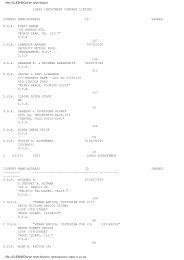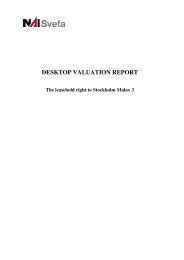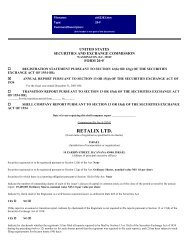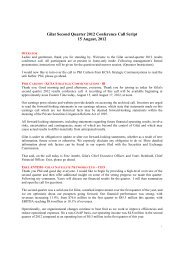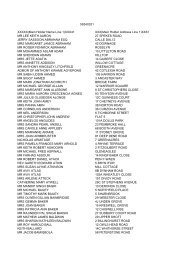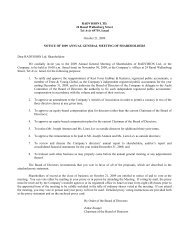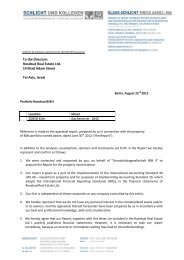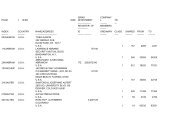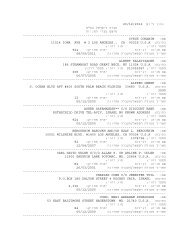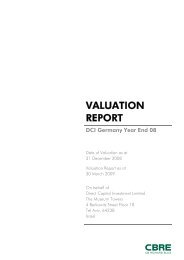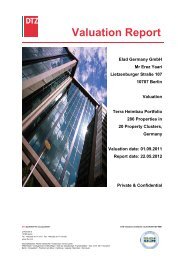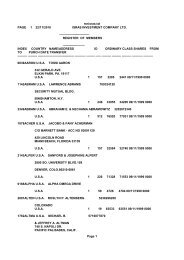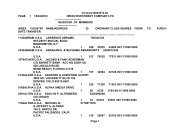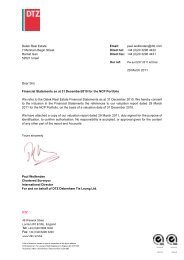XTL BIOPHARMACEUTICALS LTD.
XTL BIOPHARMACEUTICALS LTD.
XTL BIOPHARMACEUTICALS LTD.
You also want an ePaper? Increase the reach of your titles
YUMPU automatically turns print PDFs into web optimized ePapers that Google loves.
SFAS No. 160, “Noncontrolling Interests in Consolidated Financial Statements, an amendment of ARB 51,” or SFAS 160. In December 2007,<br />
the FASB issued SFAS No. 160, which changes the accounting and reporting for minority interests. Minority interests will be recharacterized as<br />
noncontrolling interests and will be reported as a component of equity separate from the parent’s equity, and purchases or sales of equity interests that<br />
do not result in a change in control will be accounted for as equity transactions. In addition, net income attributable to the noncontrolling interest will<br />
be included in consolidated net income on the face of the income statement and, upon a loss of control, the interest sold, as well as any interest<br />
retained, will be recorded at fair value with any gain or loss recognized in earnings. SFAS 160 is effective for fiscal years (including interim periods<br />
within those fiscal years) beginning on or after December 15, 2008 (January 1, 2009, for us). Earlier adoption is prohibited. The statement shall be<br />
applied prospectively as of the beginning of the fiscal year in which it is initially applied, except for the presentation and disclosure requirement which<br />
shall be applied retrospectively for all periods presented. As of December 31, 2007, our consolidated financial statements did not include any minority<br />
interests.<br />
EITF Issue No. 07-1, “Accounting for Collaborative Arrangements,” or EITF 07-1. In December 2007, the FASB ratified EITF 07-1, which<br />
defines collaborative arrangements and establishes reporting requirements for transactions between participants in a collaborative arrangement and<br />
between participants in the arrangement and third parties. EITF 07-1 also establishes the appropriate income statement presentation and classification<br />
for joint operating activities and payments between participants, as well as the sufficiency of the disclosures related to these arrangements. EITF 07-1<br />
is effective for fiscal years beginning after December 15, 2008 (January 1, 2009, for us). EITF 07-1 shall be applied using a modified version of<br />
retrospective transition for those arrangements in place at the effective date. Companies are required to report the effects of applying EITF-07-1 as a<br />
change in accounting principle through retrospective application to all prior periods presented for all arrangements existing as of the effective date,<br />
unless it is impracticable to apply the effects the change retrospectively. We are currently assessing the impact that EITF 07-1 may have on our results<br />
of operations and financial position.<br />
EITF Issue No. 07-3, “Accounting for Nonrefundable Advance Payments for Goods or Services Received to Be Used in Future Research and<br />
Development Activities,” or EITF 07-3. In June 2007, the EITF reached a consensus on EITF 07-3, which requires that nonrefundable advance<br />
payments for goods or services that will be used or rendered for future research and development activities be deferred and amortized over the period<br />
that the goods are delivered or the related services are performed, subject to an assessment of recoverability. The provisions of EITF 07-3 will be<br />
effective for financial statements issued for fiscal years beginning after December 15, 2007, and interim periods within those fiscal years (January 1,<br />
2008, for us). Early application is prohibited. The provisions of EITF 07-3 are applicable for new contracts entered into on or after the effective date.<br />
SFAS No. 159, “The Fair Value Option for Financial Assets and Financial Liabilities - including an amendment of FASB Statement No. 115,”<br />
or SFAS 159. In February 2007, the FASB issued SFAS 159, which is expected to expand the use of fair value accounting, but does not affect existing<br />
standards which require certain assets or liabilities to be carried at fair value. The objective of SFAS 159 is to improve financial reporting by providing<br />
companies with the opportunity to mitigate volatility in reported earnings caused by measuring related assets and liabilities differently without having<br />
to apply complex hedge accounting provisions. Under SFAS 159, a company may choose, at its initial application or at other specified election dates,<br />
to measure eligible items at fair value and report unrealized gains and losses on items for which the fair value option has been elected in earnings at<br />
each subsequent reporting date. SFAS 159 is effective for financial statements issued for fiscal years beginning after November 15, 2007, and interim<br />
periods within those fiscal years (January 1, 2008, for us). Were we to elect the fair value option for our existing assets and liabilities, the effect as of<br />
the adoption date, shall be reported as a cumulative-effect adjustment to the opening balance of comprehensive loss.<br />
33



